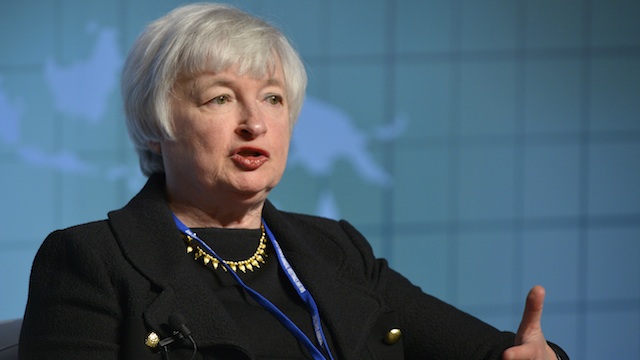SUMMARY
This is AI generated summarization, which may have errors. For context, always refer to the full article.
WASHINGTON DC, USA – US President Barack Obama on Wednesday, October 9 nominated economist Janet Yellen to lead the Federal Reserve in a move expected to sustain outgoing chairman Ben Bernanke’s focus on cutting American joblessness.
With the US economy still-struggling for momentum, Obama praised Yellen, currently Bernanke’s vice chair at the Fed, as “exceptionally qualified” to be named “one of the most important policymakers in the world.”
The appointment of Yellen would put a woman at the head of the world’s most powerful central bank for the first time, when Bernanke leaves his post at the end of January next year.
The nomination of a new Fed chair comes amid widespread concern that its path toward exiting its easy-money policies could send economic shivers around the globe.
“America’s workers and families will have a champion in Janet,” Obama said at a White House ceremony, flanked by Yellen and Bernanke.
“She is a proven leader, and she’s tough. Not just because she is from Brooklyn,” he joked.
On a serious note, Obama said Yellen “sounded the alarm early” about the housing and financial bubbles that led to the 2008-2009 recession.
“She doesn’t have a crystal ball, but what she does have is a keen understanding of how the markets and the economy work, not just in theory but also in the real world,” the US president added.
“And she calls it like she sees it.”
Yellen, 67, an economist with years of experience in academia and the Fed, made clear she was not going to break with current easy-money policies aimed at pushing down unemployment, still high at 7.3% in August.
“More needs to be done to strengthen the recovery, particularly for those hardest hit by the Great Recession,” she said as she accepted Obama’s nomination.
“The mandate of the Federal Reserve is to serve all the American people. And too many Americans still can’t find a job, and worry how they’ll pay their bills and provide for their families.”
Yellen’s nomination was not a surprise after the presumed favorite, former Treasury secretary Lawrence Summers, pulled out of the running due to opposition from Obama’s Democratic allies in the Senate.
Though criticized by conservatives as a Fed “dove” – one of a camp allegedly too determined to stimulate growth and not adequately worried about the threat of inflation – Yellen’s reception in the Senate is likely to be better than that of Summers.

Senator Elizabeth Warren, who was part of the Democratic revolt on the Senate Banking Committee against a Summers nomination, gave Yellen a thumbs-up on Wednesday.
“President Obama has made a sound decision in nominating Janet Yellen to be Chairman of the Federal Reserve. Janet has extraordinary experience and a proven track record of strong judgment and management savvy,” Warren said in a statement.
The committee’s senior Republican, Mike Crapo, was more measured, saying her nomination would be “carefully reviewed” especially in light of the Fed’s $85 billion a month bond-buying stimulus, known as quantitative easing.
“I continue to strongly disagree with the Fed’s use of quantitative easing, and am eager to learn Ms. Yellen’s vision for the direction of the Federal Reserve,” Crapo said.
One of her first tasks as Fed chief, if confirmed by the Senate, will be to judge how quickly to taper the huge stimulus. Economists and markets had widely expected it to be scaled back at the September meeting of the Federal Open Market Committee which both Bernanke and Yellen took part in.
But the FOMC made clear it believed that the economy still needed its support, at least as long as the US capital remained paralyzed over issues of funding the government in fiscal 2014, which started on October 1 without an official budget.
And it was also worried about the possibility that the government would be forced to default on its obligations if Congress did not raise the $16.7 trillion borrowing ceiling by October 17, when the Treasury says it will run out of cash without fresh borrowing power. – Rappler.com
Add a comment
How does this make you feel?
There are no comments yet. Add your comment to start the conversation.